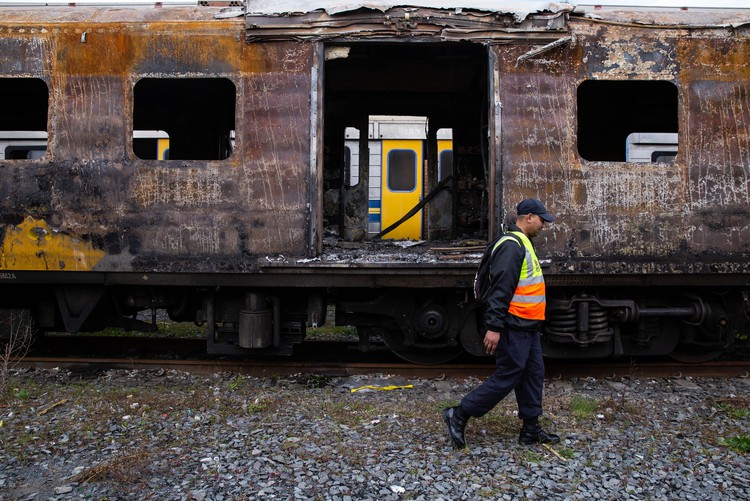Who is burning Cape Town’s trains?
#UniteBehind sends letter to President Ramaphosa calling for perpetrators to be found
#UniteBehind has requested that President Cyril Ramaphosa declare the recent arson attacks on trains in Cape Town a national disaster.
The civil society group, in a letter, has called on Ramaphosa and government to impose “unified action between the relevant authorities, including PRASA, local and national government, SAPS, the Directorate for Priority Crime Investigation (Hawks) and the National prosecuting Authority; for forensic units to find those responsible for acts of sabotage; for daily updates on progress to commuters; and a dedicated monitoring room to track incidents”.
These demands were put in a letter to the President on Tuesday.
This comes after a seat was set alight in a train in Cape Town station on Tuesday morning. A suspect has been arrested.
A fire on 21 July at Cape Town station destroyed seven rail coaches. Another on 26 July at Retreat destroyed five carriages. In May, a commuter died in a train fire near Ottery station and another woman suffered severe burn wounds. The fires have caused long delays for commuters using an already strained train service.
In its letter, #UniteBehind highlighted its #FixOurTrains campaign started in 2017 to remedy “the current crisis” experienced by train commuters daily in the Western Cape. The group believes that the attacks have been orchestrated to cripple Cape Town’s public transport system.
“These are not random acts of violence, but a concerted effort against Cape Town’s public transport system, and by extension, our economy. Our city and around half a million rail commuters are under attack,” it said.
#UniteBehind said that no plan had been put forward during a meeting with Transport Minister Blade Nzimande on 27 July. “We were all invited to an Imbizo. #UniteBehind refuses to believe that an Imbizo will solve the current crisis. Leadership, a plan, and decisive action is what is needed,” it said.
The civil society group has given Ramaphosa until Monday to respond to its demands. However, a letter sent to Ramaphosa’s office in February has yet to be answered.
On Wednesday, Matthew Hirsch of #UniteBehind said most of the recent train fires appeared to be planned and to coincide with internal leadership battles at Metrorail. “We don’t believe that these are just frustrated commuters setting carriages alight. There is a more sinister element behind these attacks,” he said.
Metrorail regional manager Richard Walker said it was still “too premature to speculate” on the reasons for the attacks. Walker added that the modus operandi for these fires was that “they were deliberately set”.
He said that because train fires were classified as malicious damage to property and not arson, the consequences for perpetrators were not as severe. “We need to lobby to change legislation so these incidents can be reported as arson. It’s not just a challenge for us, but for SAPS as well who also have challenges with prioritising policing certain areas,” he said.
Asked about #UniteBehind’s call to the President, Walker said, “We appreciate all the support, especially from a civic organisation who works in communities. The more aware communities are about this, [the more] they can self-police the system and provide us with intelligence to help catch these perpetrators.”
Support independent journalism
Donate using Payfast

Don't miss out on the latest news
We respect your privacy, and promise we won't spam you.
Letters
Dear Editor
Ek het die artikel oor die brand van treine gelees en veral die geval van twee jong mans wat 'n sitplek aan die brand gesteek het en toe weg geharloop het. Lank terug het 'n bruin seun aan my vertel dat as hulle by 'n bende wil aansluit daar van hulle verwag word om eers hulle braafheid te demonstreer. Dit het enig iets van 'n motor kaping tot die skiet van 'n poliesman ingesluit.
Nou wonder ek maar net of die brandsteek van treinwaens nie ook 'n demonstrasie van braafheid is van jong mans wat by bendes wil aansluit nie.
© 2018 GroundUp.
This article is licensed under a Creative Commons Attribution-NoDerivatives 4.0 International License.
You may republish this article, so long as you credit the authors and GroundUp, and do not change the text. Please include a link back to the original article.

